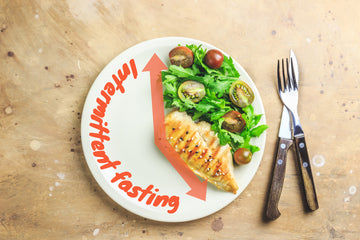by Anthony Benjamin on Oct 12, 2022

5 Tips for a Healthy, Balanced Meal
These days, there’s a lot of different nutrition information out there that can make conjuring up a healthy meal seem more complicated than it really is. How much protein should you be eating? Are carbohydrates healthy? The truth is, to achieve a healthy, balanced meal, you need to consume a combination of macronutrients (fat, protein, and carbohydrates) and micronutrients (e.g., iron, copper, zinc, etc.). To do this, follow these tips:
Focus On Protein
Protein consumption is essential for bariatric patients. You should be consuming 65 to 75 grams of protein a day.
When putting a plate of food together, make sure at least 1/3 of your plate is made up of protein-rich foods. You’ll want to eat your protein first to ensure you consume enough of it each day. Eating your protein first will also help reduce carbohydrate intake because you’ll be fuller by the time you finish your protein.
You see, protein can increase satiety. In a 2018 study, researchers found that eating a high-protein meal decreased ghrelin levels, the hunger hormone, more than a high-carb meal in obese individuals.
You also need to eat enough protein to maintain muscle mass as you age and lose weight. Age and weight loss can both reduce your muscle mass. However, increased muscle mass can help your metabolism function, making weight loss and weight maintenance more manageable.
Make sure you avoid fatty, red meat. Instead, go for moist, lean meats like poultry and fish.
Go For Good Carbohydrates
Eat whole, unprocessed fruit, legumes, and whole grains. These foods provide fiber and nutrients necessary for satiety and proper gut function. By normalizing your bowls, these foods will help you feel fuller for longer.
You’ll want to avoid refined grains, which are associated with many health issues. On the other hand, whole grains are associated with reduced type 2 diabetes, heart disease, and cancer risks. They’re also an excellent source of micronutrients like zinc, iron, magnesium, and manganese.
You should also avoid sugary carbohydrates. Processed foods often contain added sugars that do nothing for your health. Try to limit the amount of added sugars at each meal to 5 grams at the most.
Choose Healthy Fats
Weight loss will become easier when you swap out full-fat foods for low-fat or no-fat foods. Full-fat foods contain saturated fats, which are bad for your heart. You’ll also want to avoid trans fats altogether. Plant oils, nuts, and fish are the healthiest sources of fat. For example, fish contain omega-3 fatty acids.
Omega-3 fatty acids can reduce inflammation, maintain heart health, and promote proper brain function. Unfortunately, the western diet is very high in omega-6 fatty acids. These increase inflammation and are linked to many chronic diseases. Stick to omega-3 fatty acids and keep your body in a more balanced state.
Eat Your Greens
Vegetables, second to protein, are vital to maintaining a healthy diet. Eating your greens following your protein intake increases your satiety while consuming valuable vitamins and minerals. Your vegetables should make up 1/3 of your plate.
Overall, by prioritizing your vegetables, you consume fewer and healthier calories, resulting in weight loss. Plus, researchers have found that eating vegetables before a carbohydrate-rich meal has beneficial effects on blood sugar levels.
Stay Hydrated
Many studies show that drinking enough water can promote weight maintenance and increase weight loss. According to some research, it may even increase the number of calories you burn each day.
For bariatric patients, you’ll have to drink your water at least 30 minutes before your meal to ensure you don’t stretch out your stomach. Studies have shown that drinking water before meals can reduce your appetite, thus reducing food intake during your meal.
However, do not confuse hydrating with water with sugary drinks like sports drinks or soda. Replacing water with high-calorie, sugary drinks will only work to increase your weight.
Constipation can be common after bariatric surgery, especially since patients have such high protein goals. So, if they aren’t getting enough water, but crushing those protein goals, it can cause constipation.
You can also look for a protein that has added digestive enzymes that help break down protein more. This will result in less bloating and constipation. ProCare Health’s Whey Isolate Protein is a great choice that has protease and papain, both digestive enzymes.
Stay Healthy with ProCare Health
ProCare Health values its customers and their health above anything else. We provide products and valuable information for bariatric patients to achieve their optimal health goals. Look at what we have to offer today! If you have questions about our services, please contact us, and we’ll do our best to help.

How the Low FODMAP Diet Is Good for Gut Health

What Is Food Noise?


